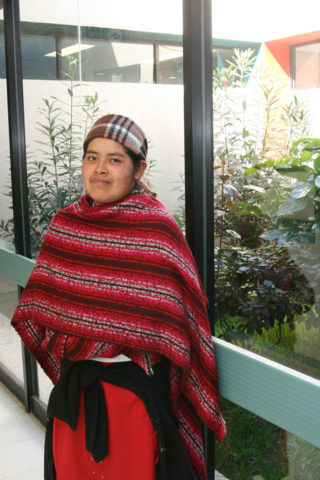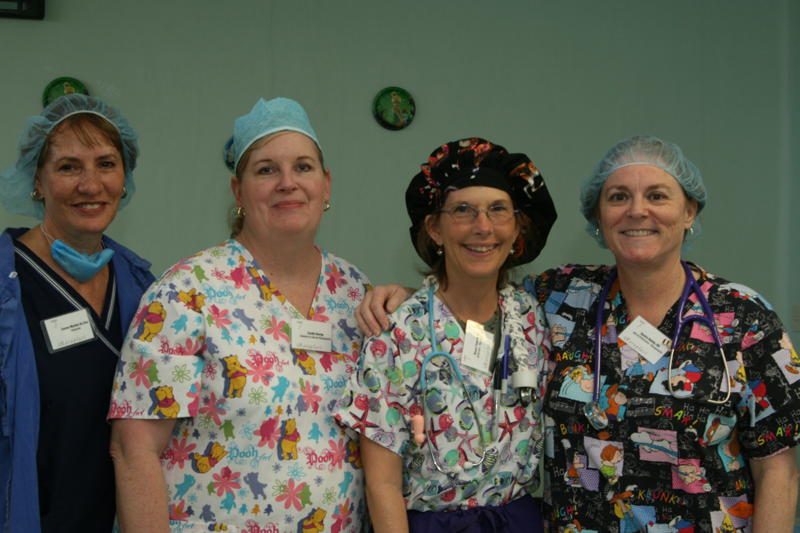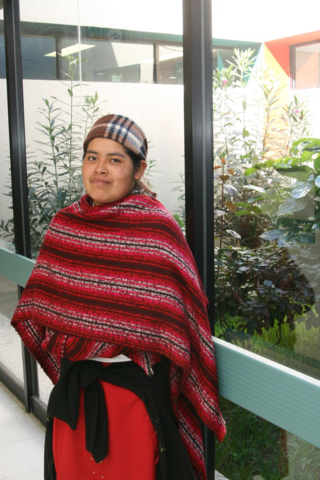Language issues can be very challenging in Oaxaca. Despite the interpreters on our team and those provided by our host Rotary club, some patients speak an indigenous language that is not easily understood by any of our interpreters. The principal language spoken in Oaxaca City and the outlying areas is Spanish, but because of the topography in the Valley, many smaller outlying communities are isolated locations that foster distinct ethnic identities that have maintained their own unique traditions and languages. There are 16 basic ethnic groups in the Oaxaca region, and each of these groups speaks its own language. Furthermore, each of these 16 distinct languages is spoken in a variety of dialects. One such language is Mixe, which has four dialects and approximately 70,000 speakers.

Today I met Anotonie, a twenty-year-old woman from a Mixe speaking town with approximately 1,500 inhabitants, San Juan Juquila Mixes. Anotonie, who speaks and reads a little Spanish, was designated by the family to travel to Oaxaca City with her 8 year-old brother, Pedro Jose who has an unrepaired cleft palate. Prior to this visit, neither had previously visited Oaxaca city, which is only four hours from their home. Her mother, who has "scars in her eyes", her father, a field worker, and an older sister who does not speak Spanish, all stayed behind.
The family learned of the Rotaplast mission from nuns in their village. Pedro Jose had his cleft lip repaired in 2004; today he will have his palate repaired by Dr. Jarquin, a local surgeon who is working with the Rotaplast doctors.
Assistant Mission Director Rose Marie Joyce, who is fluent in Spanish, acted as translator for my conversation with Anotonie. When we asked Anotonie how she would relay a message to her mother when Pedro Jose came out of surgery, she seemed confused by the question. We finally determined that the family will hear the good news when brother and sister return, in person, to San Juan Juquila Mixes.
In the ward, Mission Director Kathy Wiley has arranged for each child to receive a family photograph taken after surgery. Most of these children have never seen, let alone owned, their own photograph. Little Karla, five-years old and packed and ready to go home, could not move or stop staring at the snap shot.
Nelson, featured in Day Four, was still in the hospital this morning. His lively sister, Priscilla, was featured in Day Five as an example of the adventures of the healthy siblings who are also here. Someone asked where Priscilla was. I looked down a hallway and saw Mission Translator Carmen Sigler painting Priscilla’s fingernails. Priscilla even showed Carmen a spot missed. We think Priscilla has explored every nook and cranny of the hospital except the operating room and Post Anesthesia Care Unit (PACU).

The PACU in this hospital is heavily secured and only medical staff are allowed to attend to the patients who are delivered immediately following surgery. The Rotaplast PACU team is pictured below – translator (Ivonne Montes de Oca), patient aide (Cyndie George) and PACU nurses (Susan Fossum and Sandra Stabile). The team has a heavy burden here because parents are not present to calm their children.

PACU nurse Susan Fossum, past president of American Society PeriAnesthesia Nurses, gave me a briefing about the PACU. This is literally a forgotten part of the hospital experience because many patients (due to coming out of anesthesia) have little or no recollection that they were ever there.
The first concern of the PACU is to ensure a clear airway with ample oxygen intake. A patient may receive additional oxygen and will be monitored until it is determined that they can safely be released to the ward. After anesthesia many of our little patients have a depressed respiratory drive. The second concern is stable heart rate and good circulation. And third, pain management is crucial. When a child arrives fresh from surgery the team springs to action. The bambinos here have received first rate care. As a fond momento of their hospital stay, on leaving the PACU each of our patients receives a quilted blanket donated by a Rotary Club in Maine.




